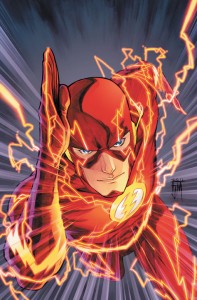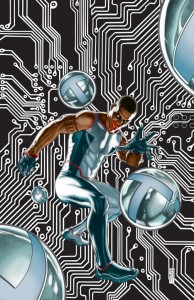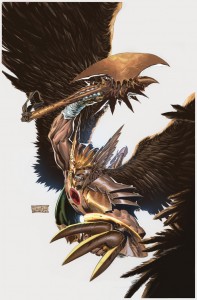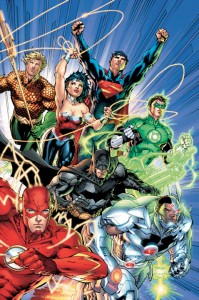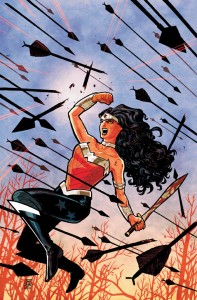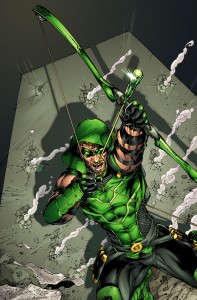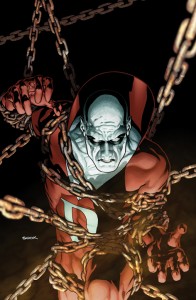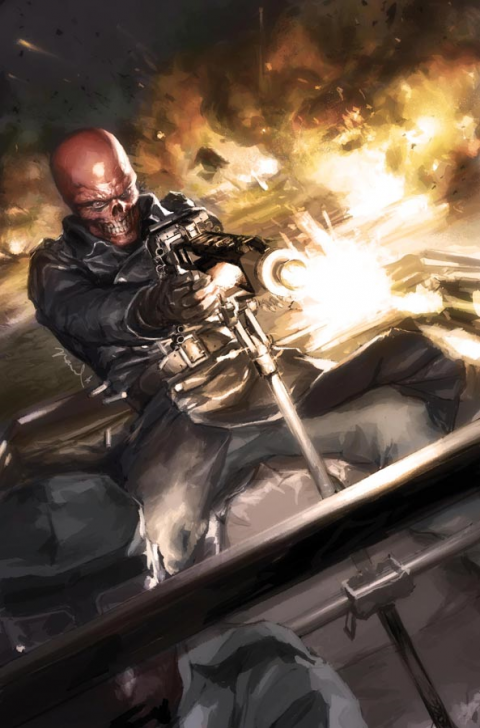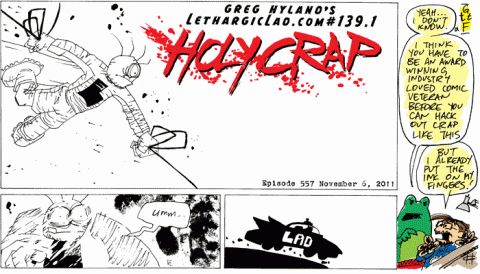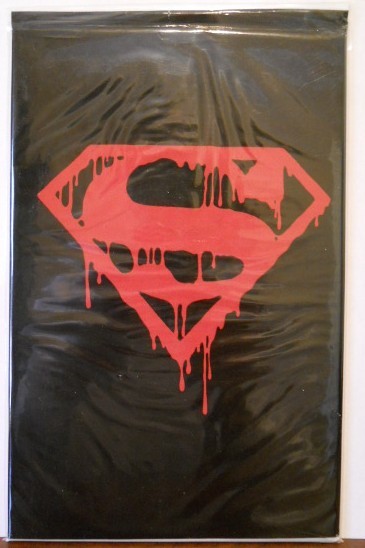Every week Comic Book Daily asks the question and the crew (and special guests) give their answers; we’ll be doing this for 52 weeks. Tip of the hat goes to the gang at Scans Daily for the inspiration and Scott VanderPloeg for this week’s question.
[box type=question]In light of DC’s announcement to reboot their entire superhero line and Mark Waid’s recent interview we have this weeks 52Q: should mainstream comic publishers target their direct market fans or the casual reader?[/box]
Kevin Boyd (Director of the illustrious Joe Shuster Awards Committee)
Why not target both? Why does it have to be one or the other? Concentrating on one only is guaranteed to alienate the other.
Scott: In the context of the question how would it be possible to target both? The DC relaunch looks to be targeting the casual reader, relaunching their entire superhero universe so that anyone can jump in start reading in print or digitally. Initial reaction seems to indicate this will alienate long-term or “hardcore” readers, effectively wiping out existing continuity.
Kevin: I disagree, what I see is targeting the new reader, while alienating the existing fanbase. In Superman Beyond Grant Morrison wrote Superman’s tombstone “to be continued…” – it’s not “Press the Reset Button to Play Again”. An example of doing both is Batman: Hush a popular storyline conceived and executed by popular creators on an existing book, or any number of the stories done by creative teams on the superhero franchise books over the last 70 years. You tell the next a linear story without resorting to revising timelines, erasing character’s “pasts” in order to make it seem “new”. You take the character, as is, and tell a great story. Sometimes that story can involve a new element, a costume change or a character death, but telling readers that it’s all new gives old readers the benefit of saying sayonara.
This will either be a massive success or potentially the biggest flop this side of the New Universe or Helix.
Chris Howard (From Egesta Comics, one of the masterminds behind Dressed For Success)
Well this initial move is sure to alienate the current fanbase. I’ve already bitched elsewhere about the few DC titles I was starting to read being pointless now.
I think the Big Two need to REALLY rethink what their business is. Are they IP management companies whose duty is solely to insure there is material to support and promote those IP’s, or are they publishers of stories by creative people in comic book form. If it’s just about getting the most people to buy the most Stupendous Man merchandise, then this is the right move for DC. But they have to not fall into the trap that Marvel has with the Ultimate line. It started out much like this, we knew there was a Spider-Man, and Avengers, some X-Men etc, but they could be slightly different versions of their iconic selves. It was a fresh start and easy to jump into for a new casual reader.
But before long, you had huge story arcs, mega crossovers and world changing events, and you might as well be trying to read Marvel Classic.
If DC means this to be a new open and approachable world, they have to change how they do business. Short stories, either single issue or maybe six at most. Self contained. No long hooks or convoluted interwoven histories. No, and I mean NO, mega crossover events. You want to lose those new casual readers? Tell the guy who’s buying Batman he has to buy Wonder Woman to get the whole story. The have to play like TV or movies. People get TV. Every week you watch your show and stuff happens, but the show remains the same at it’s core. If you wanna do a story like LOST, then it shouldn’t be in Scrubs. It should BE Lost. And you shouldn’t have to watch Cougar Town. (Community gag crossover notwithstanding).
On the surface, it could be a good move for them as a publisher of guys in tights hitting each other comic books. But it’s easy to mess up. And to the creators, I’d think it was very unappealing. Or at least, it’s going to develop, (as I think it should) into the McDonalds of comic work. You start out early in your career as a Marvel or DC freelance hack, jumping around from assignment to assignment, never getting to attached to what you are working on, because it’s only ever for a short stint. When you make a name for yourself, you can turn that into the ability to write or draw your own material. Think of it like Harlequin. Lots of people write romance novels for Harlequin, random stuff, month after month. Some writers build up a large body of work and gain notoriety, maybe become one of their star writers. Then they begin writing novels outside Harlequin, branching out, widening and deepening their writing career.
It’s a bit of a step backward in some ways, back to the bullpen days. The alternate is those creators who are on the fringe of things, writing/drawing their own stuff and building a career that way, also perhaps becoming big well known artists with best selling books. Some may be happy to just take whatever gig they get, and that’s fine. The big names we all worship did that. JR JR, still does, with a few exceptions.
Let’s face facts, the direct market cannot survive. it’s insular, it grows up and leaves, gets ticked off and leaves. It’s hard to bring new people into the fold. They won’t all go away with this shift. Those who really just love reading about Batman, will always want to read about Batman. Those who love a particular creator may very well just buy whatever they work on. But a larger COMIC reading market, is good for comics.
I’m still pissed that I just bought Birds of Prey and now it won’t matter for squat, but who knows, maybe this will tell me whether I really like those characters, or just the creators who were telling their story.
Greg Hyland (Writer/illustrator of the cult classic Lethargic Lad & Lego Star Wars)
Best case would be catering to both. But they way things are going, as there just aren’t enough direct market fans, catering to new “casual” fans may not be a bad idea.
These companies, and DC more so, need to increase sales, period. They’re scrambling to do whatever they can do. And they’re in a market where DC isn’t just competing with Marvel, but they’re competing with video games, Netflix and the internet, and idiotic “comic fans” who think nothing of downloading new comics for free of torrent sites. So they’re doing whatever they can. So with this, surely what they want to do is turn the new casual reader into the next hardcore direct market fan. And for all the current fans who are moaning about how much they hate it, I’m pretty sure a large percentage will pick up some of these new DC books anyway.
In a sort of side note, I remember having a discussion with a “big wig” at DC once, whop told me that publishing comics is a pain in the ass. For the amount of effort you put in to them, you don’t make a lot of money and you get tons of complaints about just about anything you do. He pointed out that a movie like “Batman and Robin,” which was universally HATED, generated way more money than the Batman comic book, and employed way more people, so as a business, what makes more sense to make? Comic books, or movies and merchandise? Sorry, but these days, not enough people love comic books.
Ed Campbell (Blogger – Trust Me I Know What I’m Doing)
The comic companies should cater to the direct market fan and the casual reader. It will generate new sales and help build the brand. With clever planning they could construct stories that will satisfy both reader. Unfortunately the casual reader will eventually move on, and it will be up to the dedicated comic fan to keep things going, until the next re-boot.
Anthony Falcone (Writer of Whosoever Holds This Hammer)
The industry needs to increase its broad appeal. The current plan of taking the fanboys they have and creating edgy multi-part crossovers that supernerds feel compelled to buy isn’t working.
Superhero comic books are supposed for everyone. And everyone includes children. I might enjoy Spider-Man on a different level than a 7 year old but we both still enjoy the story. There are far more adult stories now than 20 years ago. And with a rating system in place both Marvel and DC have told customers that they plan on making the majority of their comic books for readers 13 and up. It is no wonder that readership has gone down when you have started to exclude entire sections of the reading public (I know that competition for entertainment dollar and increased prices also have something to do with it).
Casual fans and Direct Market like the same things: good stories. Companies need to stop making everything a 14 part crossover that ends up in an oversized hardcover and go back to episodic story arcs made up of cogent individual stories. Accessible for the casual fan and the appealing direct market. Movies and toys don’t transfer into comic book sales because the former are marketed to a wider audience. Parents of younger children who have been introduced to Iron Man or Thor through the silver screen will be hard pressed to find appropriate titles in today’s market. DC rates Superman 12+ right now. How does that make any sense?
Fewer stupid crossovers and mini-series. Fewer titles in general. And give the public good stories that ship on time. If you build it they will come.
David Diep (Raconteur and Man About Town)
While I feel that comic publishers should try to increase their appeal, the manner in which they do it matters. Does DC really think that a complicated timeline and universe is what’s really stopping casual people from getting into reading comics? If they really want to draw interest to the characters for a broader market, they should do what Marvel originally did with the original Ultimate line and that was a pretty big success. It sort of made 2 parallel product lines, one for the die-hards and one for the newer casual readers to ease them into the 616 titles. I thought Superman Earth-One was going to serve as their version of the Ultimate universe and while it was a good read that did gangbusters on it’s release, they didn’t do anything with it. Earth-One was a great read for casuals that wanted to read a Superman story without having to look at wikipedia and it left them wanting more. They could have easily followed that with a monthly or spin-offs that new readers could latch onto from the beginning.
Scott VanderPloeg (Editor In Chief, PITA to all CBD contributors)
The trick has always been to keep your existing customers while attracting new ones. At some point a lot of comic creators forgot this was a business. Since they were fanboys they wrote comics they wanted, keeping continuity and developing long and intricate storylines. The hardcore fan creating for other hardcore fans.
Collected editions have allowed this to continue as the casual or new reader can get a complete story in one volume and for the most part can pick up background and continuity along the way.
With digital comics the casual or new fan can’t jump into too many series without some background. DC’s reboot allows them to start fresh, limit the amount of continuity or back story required and give readers something they can get into, new comic fan or old. A Jerry Maguire moment. If they can keep storylines to a few issues and start each with the framework the reader needs to enjoy it then every type of comic reader will be served.
It doesn’t take a complete reboot of a comic universe: it takes an editorial direction and the fortitude to stick to it.

